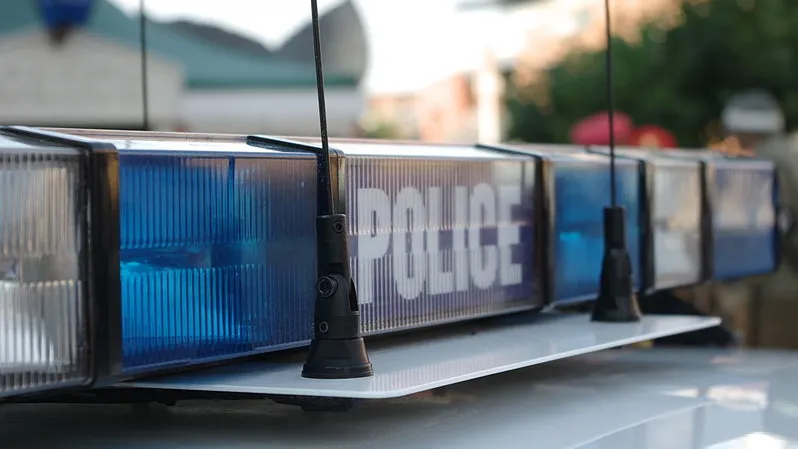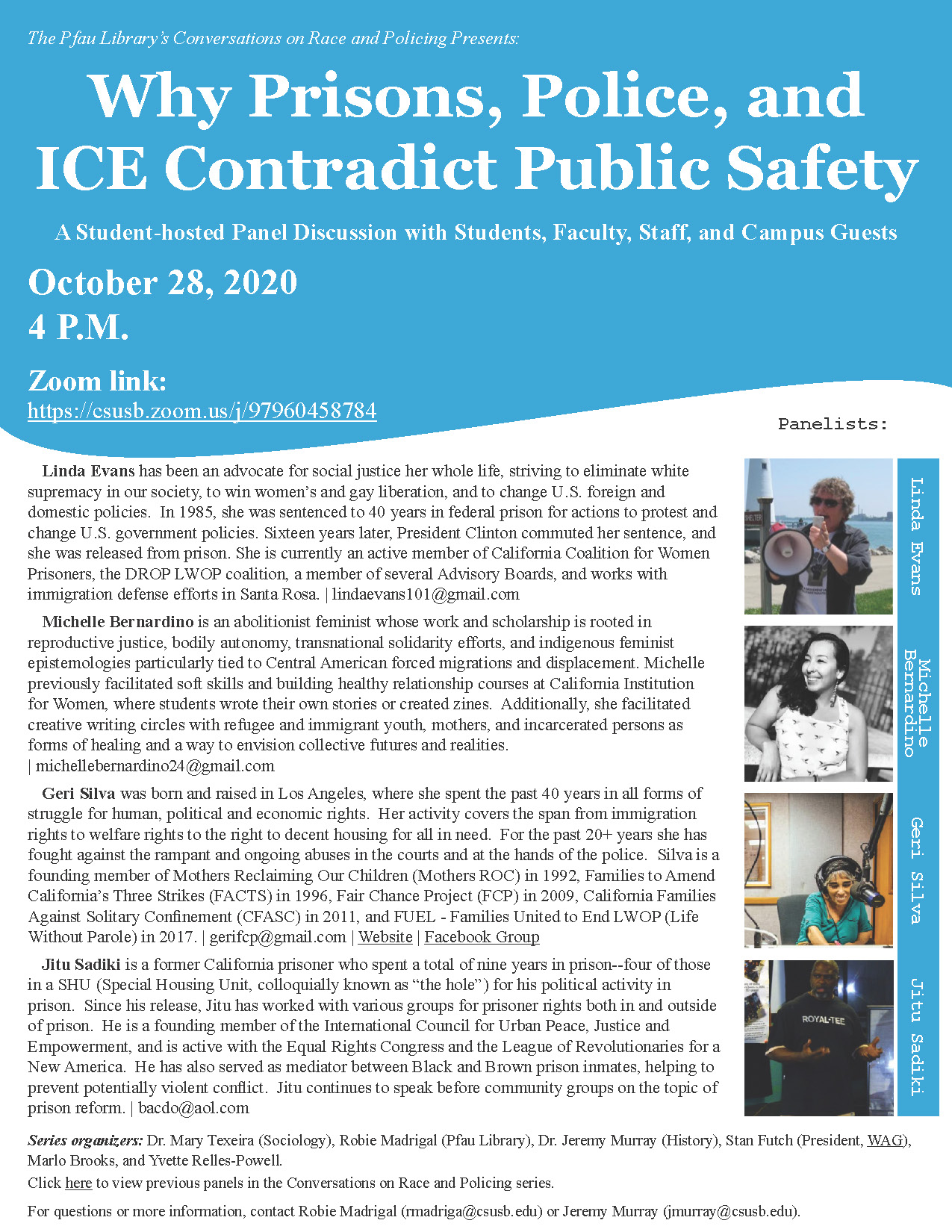Joe Gutierrez | CSUSB Office of Strategic Communication | (951) 236-4522 | joeg@csusb.edu

The panel discussion “Why Prisons, Police, and ICE Contradict Public Safety” will take place on Wednesday, Oct. 28, at 4 p.m. as part of the next Conversations on Race and Policing series.
“This discussion will focus on how ICE, police and prisons can be institutions of repression and oppression and not for public safety for all citizens,” said one of the panelists, Geri Silva. “The times we are living through demand that we examine these systems for the public good."
The event will take place virtually and can be accessed from a PC, Mac, Linux, iOS or Android at https://csusb.zoom.us/j/97960458784.
The panelists include:
- Linda Evans, who has been an advocate for social justice her whole life, striving to eliminate white supremacy in society, to win women’s and gay liberation, and to change U.S. foreign and domestic policies. In 1985, she was sentenced to 40 years in federal prison for actions to protest and change U.S. government policies. Sixteen years later, President Clinton commuted her sentence, and she was released from prison. She is currently an active member of California Coalition for Women Prisoners, the DROP LWOP (Life Without Parole) coalition, a member of several advisory boards, and works with immigration defense efforts in Santa Rosa.
- Michelle Bernardino, who is an abolitionist feminist whose work and scholarship is rooted in reproductive justice, bodily autonomy, transnational solidarity efforts, and indigenous feminist epistemologies particularly tied to Central American forced migrations and displacement. Bernardino previously facilitated soft skills and building healthy relationship courses at the California Institution for Women, where students wrote their own stories or created zines. Additionally, she facilitated creative writing circles with refugee and immigrant youth, mothers, and incarcerated persons as forms of healing and a way to envision collective futures and realities.
- Geri Silva, who was born and raised in Los Angeles, where she spent the past 40 years in all forms of struggle for human, political and economic rights. Her activity covers the span from immigration rights to welfare rights to the right to decent housing for all in need. For the past 20+ years she has fought against the rampant and ongoing abuses in the courts and at the hands of the police. Silva is a founding member of Mothers Reclaiming Our Children (Mothers ROC) in 1992, Families to Amend California’s Three Strikes (FACTS) in 1996, Fair Chance Project (FCP) in 2009, California Families Against Solitary Confinement (CFASC) in 2011, and FUEL - Families United to End LWOP (Life Without Parole) in 2017.
- Jitu Sadiki, a former California prisoner who spent a total of nine years in prison, four of those years in a SHU (Special Housing Unit, colloquially known as “the hole”). Since his release, Sadiki has worked with various groups for prisoner rights both in and outside of prison.
Conversations on Race and Policing began in the aftermath of the May 25 death of George Floyd while in the custody of four Minneapolis, Minn., police officers. A video of the incident posted on social media has led to widespread protests, the firing of four police officers, the arrest of one officer on a second-degree murder charge, the other three on charges of aiding and abetting second-degree murder – and a spotlight worldwide on race and policing.
Previous forums also are posted online (more recordings will soon be available for viewing) on the CSUSB History Club Lecture Series YouTube channel.
The ongoing Conversations on Race and Policing series is hosted by CSUSB students Marlo Brooks and Yvette Relles-Powell.
The series is organized by Brooks and Relles-Powell, CSUSB faculty members Mary Texeira (sociology) and Jeremy Murray (history), Robie Madrigal, public affairs/communication specialist for the CSUSB John M. Pfau Library, and community member Stan Futch, president of the Westside Action Group.
A programming note: Conversations on Race and Policing will not take place on Nov. 4. Instead, beginning at 6:30 p.m. on that date, organizers would like to share Cal State Long Beach's presentation, "Criminalizing Poverty & Police Reform: Two Scenes from Downtown Los Angeles' Skid Row." The talk by Deshonay Dozier, CSULB associate professor of geography, will focus on how American Indian poor people initiated police reforms and alternative sites of care in response to first wave urban redevelopment in downtown Los Angeles during the 1960s and 1970s.
Hosted by the CSULB Department of Geography, the Zoom link to join the presentation is https://csulb.zoom.us/j/87413421292?pwd= VXFuK2VBMXp6NUo4QVN2RDBKSGZKQT09.
For more information, contact Robie Madrigal at rmadriga@csusb.edu or Jeremy Murray at jmurray@csusb.edu.
